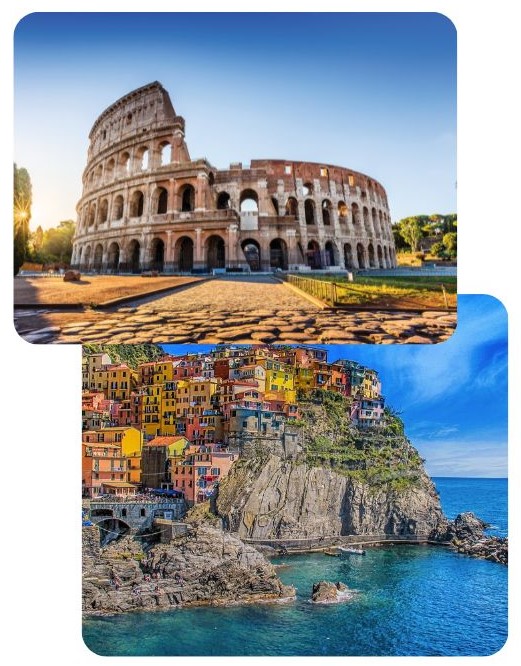The Elective Residence Visa for Italy
The Elective Residence Visa is the ideal pathway for becoming a resident in Italy if you have a stable passive income.
Let us help you navigate the complexities of immigration with ease, turning your dream of Italian residency into a reality.
The Elective Residence Visa for Italy
Ideal for retirees, remote income earners, and those seeking a serene life in one of Europe’s most beautiful countries, the Elective Residence Visa is your gateway to a new beginning in Italy.

Why the Elective Residence Visa?
- Retirement Paradise: Italy’s Elective Residence Visa allows retirees to enjoy Italy’s relaxed lifestyle, scenic beauty, and vibrant culture without needing to work.
- Financial Flexibility: Passive income, such as pensions or investments, qualifies you for this visa, making it ideal for those with stable, non-work-based income streams.
- Quality of Life: Italy offers high living standards, including excellent healthcare, diverse food, rich arts, and welcoming communities, enhancing the retirement experience.
- Long-Term Stability: The visa provides a renewable residence status, allowing holders to reside in Italy long-term and even consider permanent residence after five years.
- Schengen Area Access: Residency in Italy means visa-free travel across the Schengen Zone, providing flexibility to explore other European destinations easily.
Requirements
Learn about the essential requirements and steps needed to successfully apply for the visa
Financial Means
Demonstrate a stable, passive income sufficient to support yourself without working in Italy.
Police Clearance
Provide a police clearance certificate from your home country, demonstrating a clean criminal record.
Accommodation
Secure suitable housing in Italy prior to applying. This can be evidenced through a registered lease agreement or proof of property ownership.
Process Stages
Explore our streamlined process stages to understand how we efficiently guide you from start to success
- Financial Documentation: Gather proof of sufficient passive income, such as pensions or investment returns, meeting the minimum annual requirement (e.g., €31,000 for an individual).
- Accommodation: Secure housing in Italy through a lease agreement or property purchase.
- Health Insurance: Obtain comprehensive health insurance valid in Italy, covering at least €30,000 per year.
- Visa Application Form: Complete and sign the Italy Long-Stay Visa Application Form.
- Supporting Documents: Prepare necessary documents, including passport-sized photos, civil status certificates, and police clearance.
- Consulate Appointment: Schedule and attend an appointment at the Italian consulate in your jurisdiction to submit your application and pay the visa fee.
- Travel to Italy: Upon visa approval, enter Italy within the visa’s validity period.
- Codice Fiscale: Obtain a tax identification number (Codice Fiscale) from the Italian Revenue Agency, essential for various administrative processes.
- Residence Permit Application: Within eight days of arrival, apply for a residence permit (Permesso di Soggiorno) at the local Questura (police headquarters).
- Bank Account: Open an Italian bank account to manage finances locally.
- Register Residency: Declare your residence at the local Anagrafe (registry office) to obtain a residency certificate.
- Healthcare Registration: Enroll in the National Health Service (Servizio Sanitario Nazionale) if eligible, or maintain private health insurance.
- Tax Obligations: Fulfill any tax requirements as a resident, including declaring worldwide income if applicable.
Now it's time to contact us
Frequently Asked Questions
The Elective Residence Visa (ERV) is designed for non-EU nationals who wish to reside in Italy without employment in the country. Applicants must have stable and sufficient passive income, such as pensions, dividends, or rental income, to support their lifestyle in Italy.
The ERV is for individuals with substantial passive income sources that can cover their living expenses in Italy without needing employment. Eligible sources of income include pensions, rental earnings, dividends, or financial investments. Salaries from active employment are generally not accepted.
Income requirements vary by consulate but generally range from €31,000 to €40,000 annually for a single applicant. Higher amounts may be required for families. Specific amounts and evidence requirements should be confirmed with the Italian consulate where you plan to apply.
Key documents include a completed visa application, valid passport, proof of income (e.g., bank statements, tax returns), proof of accommodation in Italy, health insurance valid in Italy, and sometimes a criminal background check. Requirements may vary, so consulting the specific consulate’s checklist is recommended.
Applicants must present proof of a residence in Italy, such as a lease agreement, property deed, or letter of invitation from a host. This document demonstrates the applicant’s commitment to residing in Italy and is essential for visa approval.
Yes, comprehensive health insurance that covers at least €30,000 in medical expenses, hospitalization, and repatriation in Italy is mandatory. The insurance must be valid for the entire intended duration of stay in Italy.
No, the ERV does not allow the holder to engage in any employment or business activity in Italy. It is strictly for those who intend to live in Italy on passive income without engaging in paid work.
The ERV is generally valid for one year. After this period, visa holders can apply for a residency permit (permesso di soggiorno) in Italy, which may be renewable annually as long as they continue to meet the visa requirements.
Yes, eligible family members, such as a spouse and minor children, can join the applicant. However, the primary applicant must demonstrate additional income to support each family member. Proof of family relationship and dependent documentation is required.
After arriving in Italy, ERV holders must apply for a residency permit within eight days. The permit application is made at the local Questura (police station). This process involves providing your visa, proof of income, accommodation, and health insurance to formalize legal residency in Italy.
